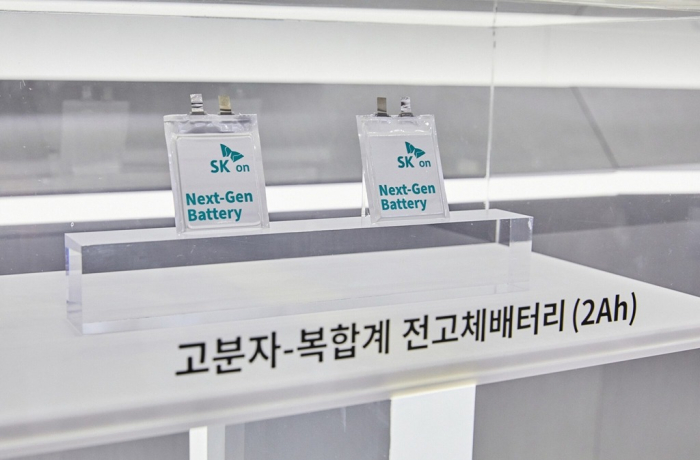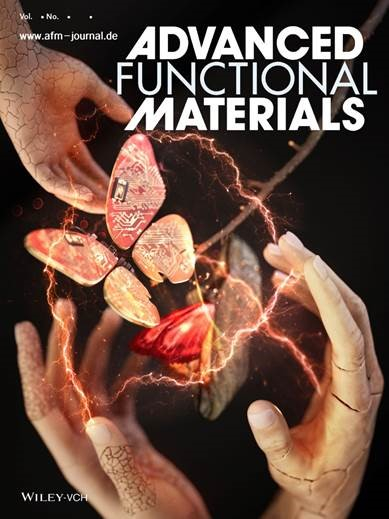Batteries
SK On unveils new material to improve EV battery capacity
SK On, Dankook Univ. develop solid electrolyte with atmospheric stability, high conductivity that can raise cell capacity by 25%
By Aug 31, 2023 (Gmt+09:00)
2
Min read
Most Read
LG Chem to sell water filter business to Glenwood PE for $692 million


KT&G eyes overseas M&A after rejecting activist fund's offer


Mirae Asset to be named Korea Post’s core real estate fund operator


StockX in merger talks with Naver’s online reseller Kream


Meritz backs half of ex-manager’s $210 mn hedge fund



SK On Co., the world’s fifth-largest electric vehicle cell maker, has unveiled a new material to improve its competitiveness in the solid-state battery segment, a game changer in the EV sector.
The secondary battery maker of South Korea’s No. 2 conglomerate SK Group said on Thursday that it jointly developed a new solid electrolyte with the world’s best lithium-ion conductivity.
The result of the development with researchers at Dankook University in South Korea was published in Advanced Functional Materials, a peer-reviewed scientific journal. SK On and Dankook have applied for patents for the technology at home and abroad.
“The solid electrolyte with both ion conductivity and atmospheric stability is expected to have a significant ripple effect as it is an innovative technology for high-quality all-solid-state batteries,” said Choi Kyoung Hwan, SK On’s executive vice president at the next-generation battery research and development center.
Solid-state batteries are touted as “dream batteries,” which the global cell industry is scrambling to develop, due to their higher safety and energy density levels than lithium-ion products.
IMPROVES LITHIUM-ION CONDUCTIVITY BY 70%
Researchers of SK On and Dankook said they improved lithium-ion conductivity by 70% compared to the existing materials to the world’s top level by adjusting the additives of lithium lanthanum zirconium oxide (LLZO), a lithium-stuffed garnet material under investigation for its use in solid-state electrolytes in lithium-based battery technologies.
Lithium-ion conductivity, the speed of lithium-ion’s movements in an electrolyte, is a key factor of batteries’ output and charging. A better conductivity raises cells’ output and reduces charging time.
The researchers improved atmospheric stability by tailoring the microstructure of LLZO, which often reduces conductivity when exposed to air, SK On said.
“These findings represent a significant step toward achieving air-stable, highly conductive solid electrolytes with normal grain growth that will reduce interfacial resistance and improve the power density and cyclability of next-generation ASSBs,” the researchers said in an abstract of the paper published on Advanced Functional Materials, referring to all-solid-state batteries.

TO INCREASE BATTERY CAPACITY
The technology will raise battery capacity by up to 25% in theory, SK On said.
The solid electrolyte may not only be used for current solid-state batteries based on nickel-cobalt-manganese (NCM) cathodes but also for next-generation models such as lithium-sulfur batteries and lithium-air cells, according to the company.
The technology, which is predicted to improve fire safety and EV mileage, can be applied to solid-state batteries under development by SK On.
The company is developing solid-state batteries with an aim to produce prototypes in 2026 for commercialization in 2028. It is building a pilot plant for next-generation batteries in South Korea to be completed next year.
Write to Il-Gue Kim at black0419@hankyung.com
Jongwoo Cheon edited this article.
More to Read
-
 BatteriesSK On to spend $352 million to mass produce solid-state batteries by 2028
BatteriesSK On to spend $352 million to mass produce solid-state batteries by 2028Apr 24, 2023 (Gmt+09:00)
2 Min read -
 BatteriesSamsung leader eyes solid-state batteries as future growth engine
BatteriesSamsung leader eyes solid-state batteries as future growth engineFeb 27, 2023 (Gmt+09:00)
2 Min read -
 BatteriesLG Energy develops safer, long-lasting solid-state battery technology
BatteriesLG Energy develops safer, long-lasting solid-state battery technologySep 24, 2021 (Gmt+09:00)
2 Min read
Comment 0
LOG IN


